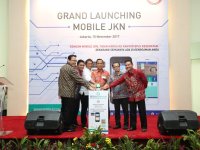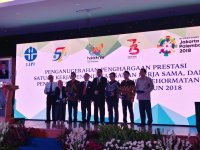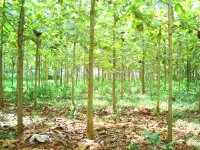Forest fires affect many parts of Southeast Asia, resulting in extensive environmental destruction, health problems, school closures and transport cancellations. Haze Gazer is a web‐based decision support system for disaster management authorities which harnesses multiple sources of data to provide insights on haze disaster dynamics.
Country: Indonesia
High transaction costs, long bureaucracy, and a weak controlling system create bad image of public services, especially in terms of forestry business. One Timber One ID (SIPUHH) is an innovation as a tool in controlling forestry business. It provides a system in which any timber traded has an ID, so its origin and legality can be identified. It promotes greater accountability on the timber industry to respect forestry law.
Case Study
MAGMA Indonesia (Multiplatform Application for Geohazard Mitigation and Assessment in Indonesia)
MAGMA Indonesia is an system that streamlines the process of geological hazard mitigation. It raises the bar on the standard of data monitoring and management for Indonesian government agencies. MAGMA digitizes relevant geological data into integrated databases, making them easier to analyze and use. Frequent readings and analytics can now be made ready in an almost-real-time manner. As a public service, MAGMA makes geological hazard mitigation and assessment available for free, anytime and…
BPJS Kesehatan is the largest health insurance provider in the world, serving 201 million people in 2018 (80% of Indonesia’s population). In January 2014, BPJS Kesehatan transformed from a state-owned company (PT Askes) with 16 million members into a service suddenly responsible for 121 million people. BPJS Kesehatan has over 7,000 employees, yet this is still not enough to serve the huge number of people requiring their services. This led to the innovation of creating a mobile application.
Conditions in Indonesia today are contrary to the principle of openness towards intellectual property (IP). The presence of a digital IP management platform called INTIP DAQU would uncover valuable information of technologies produced through R&D by Indonesian institutions. INTIP DAQU has been utilized by universities, R&D institutions and regional governments on a Free-License basis, while IP data between institutions are interconnected, creating a technology marketplace.
Two decades ago, 80% of Indonesia’s timber exports consisted of illegally-sourced wood. In order to combat this problem and to promote more sustainable forest management, the Government of Indonesia developed an innovative multi-stakeholder approach to ensure that wood products and raw materials would only be obtained or come from sources whose origins and management were legal and sustainable. Thus, the Timber Legality Assurance System (Sistem Verifikasi Legalitas Kayu – SVLK) was born.
The Health Office launched a partnership Strategy program to promote the uptake of midwives and health facilities, establishing a synergy between Shamans and Village Midwives. The results of this problem have cut by more than half the maternal mortality rate during child birth.
The programme “Outreach Services: Empowering Persons with Intellectual Disabilities in Their Community” empowers persons with disabilities in order to gain independence and encourage the realization of an inclusive social environment that is friendly and caring towards the people with disabilities. It takes a family and community-based social-service model, and the inclusiveness of the innovation also avoids the separation the beneficiaries from their family and community.
Compared to…



